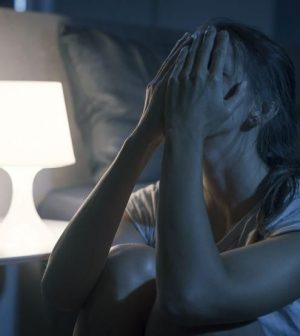- Could Your Grocery Store Meat Be Causing Recurring UTIs?
- Are You Making This Expensive Thermostat Error This Winter?
- Recognizing the Signs of Hypothyroidism
- 10 Strategies to Overcome Insomnia
- Could Artificial Sweeteners Be Aging the Brain Faster?
- Techniques for Soothing Your Nervous System
- Does the Water in Your House Smell Funny? Here’s Why
- Can a Daily Dose of Apple Cider Vinegar Actually Aid Weight Loss?
- 6 Health Beverages That Can Actually Spike Your Blood Sugar
- Treatment Options for Social Anxiety Disorder
Poll Finds Strong Links Between Depression and Lack of Sleep

A new poll on sleep and mental health has found that more than 90% of adults who reported they get good sleep were also free of depressive symptoms.
In its annual poll, the nonprofit National Sleep Foundation (NSF) focused this year on the impact of sleep on mental health because of the current mental health crisis in the United States.
“In the day-to-day execution of our sleep health mission, we give lots of simple, evidence-based and consensus-driven tips and tools to help people get enough of the quality sleep they need. For this year’s poll, we were compelled to look again at the connection between sleep health and mental health conditions like depression,” NSF CEO John Lopos said in a foundation news release.
The Sleep in America poll also found that about 65% of adults who were dissatisfied with their sleep experience had mild or greater levels of depressive symptoms.
Those who reported difficulties falling or staying asleep just two nights a week had higher levels of depressive symptoms than those without sleep difficulties.
About 50% of all adults who sleep less than the recommended seven to nine hours nightly experienced mild or greater levels of depressive symptoms.
“One unique aspect of this year’s research was how we combined NSF’s multiple validated measures of the population’s sleep health with an established measure of depressive symptoms, to examine the link between sleep health and depressive symptoms in the general population,” said Joseph Dzierzewski, vice president of research and scientific affairs at the NSF.
“As a licensed clinician, I’d say there’s never been a more important time to think about the strong connection between our sleep and mental health,” he said in the release.
The foundation recommends talking with a health care provider if you can’t sleep and have already taken some basic healthy sleep steps. Contacting a provider is especially important if you’re having challenges with your mood or feelings of depression, the NSF said.
Call or text the Suicide and Crisis Lifeline at 988 if you’re having suicidal thoughts, the foundation advised.
More information
The U.S. Office of Disease Prevention and Health Promotion has more on the importance of sleep.
SOURCE: National Sleep Foundation, news release, March 9, 2023
Source: HealthDay
Copyright © 2026 HealthDay. All rights reserved.










